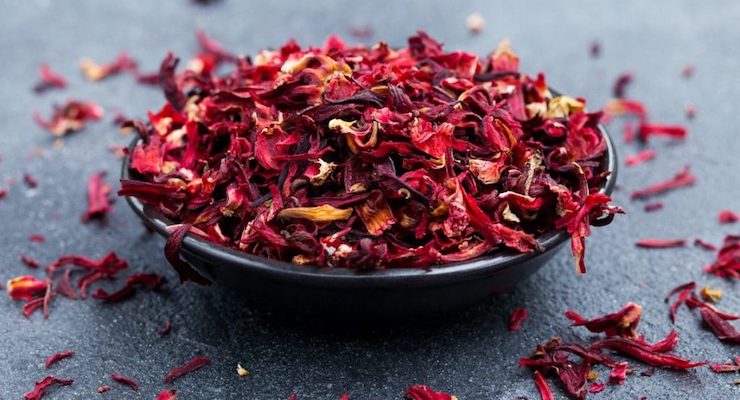04.18.22
A complex of hibiscus and lemon balm extracts marketed by Monteloeder as Metabolaid, which has previously been studied for potential cardiovascular health benefits, was evidenced in a recent in vivo study to have potential gut health benefits. The polyphenol-rich ingredient may help beneficially modulate gut bacteria, and promote increases in short-chain fatty acid production, concluded researchers. The study, which evaluated longitudinal fecal samples collected from a male and female volunteer, appeared in the Journal of Functional Foods.
In addition to polyphenols, the ingredient contains active compounds including anthocyanins, verbascoside, and hibiscus acid.
According to the authors, active compounds in Metabolaid may aid in modulating and supporting higher relative abundance of some major microbiota strains including Bifidobacterium, Blautia and Faecali-bacterium and of other minor genera such as Prevotella and Akkermansia. Supplementation with Metabolaid also demonstrated a lower Firmicutes/Bacteroides (F/B) ratio. A high F/B ratio has been observed in obesity, and lowering the F/B ratio may help support weight loss, the authors wrote.
The research showed that Metabolaid may also promote increases in short-chain fatty acid production, particularly butyric acid. Butyric acid is produced by gut bacteria, and is used as an energy source for cells in the colon.
Short-chain fatty acids are produced by certain bacteria as a consequence of digesting complex carbohydrates such as fiber, and may play a role in the bodily functions affecting inflammation, immunity, and nutrient absorption. They are also implicated in obesity and metabolic syndrome. A plant-based diet rich in polyphenols increases short-chain fatty acid production.
The study also confirmed Metabolaid’s high bioavailability, and that it may be safely and completely metabolized by the gut microbiota. According to the authors, the research also supports a prior hypothesis that the bioactive compounds in Metabolaid may exert beneficial gut microbiome-modulating properties in vivo, although additional studies covering more population groups are needed.
In addition to polyphenols, the ingredient contains active compounds including anthocyanins, verbascoside, and hibiscus acid.
According to the authors, active compounds in Metabolaid may aid in modulating and supporting higher relative abundance of some major microbiota strains including Bifidobacterium, Blautia and Faecali-bacterium and of other minor genera such as Prevotella and Akkermansia. Supplementation with Metabolaid also demonstrated a lower Firmicutes/Bacteroides (F/B) ratio. A high F/B ratio has been observed in obesity, and lowering the F/B ratio may help support weight loss, the authors wrote.
The research showed that Metabolaid may also promote increases in short-chain fatty acid production, particularly butyric acid. Butyric acid is produced by gut bacteria, and is used as an energy source for cells in the colon.
Short-chain fatty acids are produced by certain bacteria as a consequence of digesting complex carbohydrates such as fiber, and may play a role in the bodily functions affecting inflammation, immunity, and nutrient absorption. They are also implicated in obesity and metabolic syndrome. A plant-based diet rich in polyphenols increases short-chain fatty acid production.
The study also confirmed Metabolaid’s high bioavailability, and that it may be safely and completely metabolized by the gut microbiota. According to the authors, the research also supports a prior hypothesis that the bioactive compounds in Metabolaid may exert beneficial gut microbiome-modulating properties in vivo, although additional studies covering more population groups are needed.




























